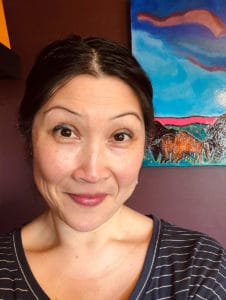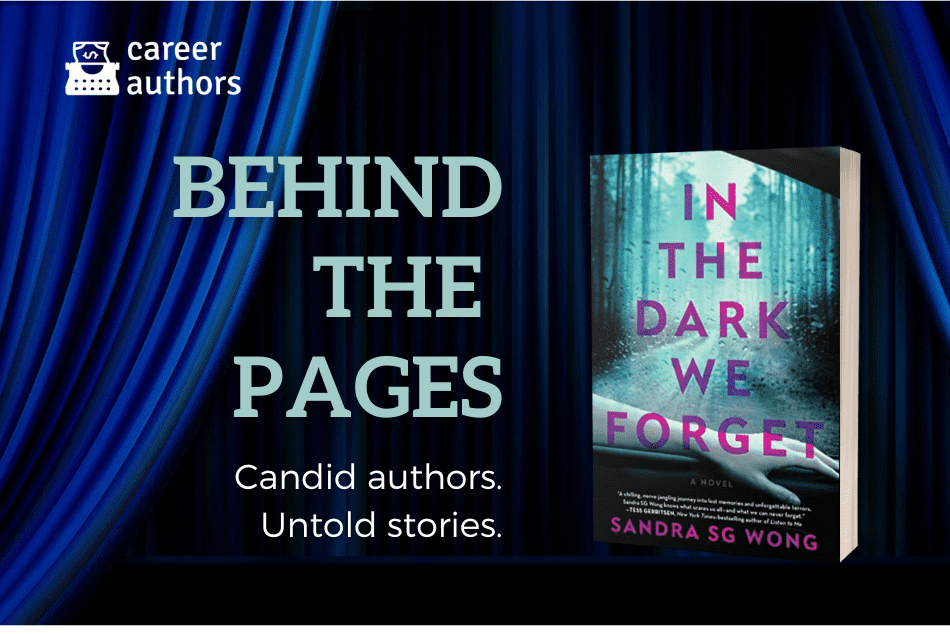Sandra SG Wong writes in multiple genres, including the cross-genre Lola Starke novels and Crescent City short stories. She has been a finalist for the Crime Writers of Canada Awards of Excellence (Best First Novel and Best Short Story) and longlisted for the Whistler Independent Book Awards (Best Crime Fiction). Her first contemporary suspense/thriller, In the Dark We Forget, releases this week. Some things, the book’s haunting description begins, are better left forgotten.
In this Career Authors exclusive, she treats us to a glimpse Behind the Pages.
-
What’s the title of your book—and was that always the title?
In the Dark We Forget is the title now. When I wrote it, it was called Windfall. That’s the title I queried with to find an agent, and that’s the title we stuck with when submitting to editors. But the marketing team at HarperCollins Canada felt the original title wasn’t enough to stand out. I brainstormed a few ideas with my agent Lauren Abramo, and she ultimately came up with this final title—which I love.
-
Who’s the main character of your book—and was that always their name?
The main character is a woman with amnesia. She does discover her name not too deep into the book, but I don’t want to spoil it here. I can say it was definitely always her name, though she prefers a slightly different version than what I originally came up with. Her reasons are solid, though, so I didn’t kick up a fuss.
-
At the start of the book, what’s the character’s goal?
Her immediate goal when the book starts is to (physically) get somewhere with people and technology, so she can start to sort out who she is and why she woke up at the side of a mountain highway.
-
What was the core idea for this novel—a plot point? a theme?—and where did it come from?
The idea came during a 2018 road trip in the Canadian Rockies. My husband and I were heading west from Lake Louise, Alberta, toward a secluded resort in Yoho National Park in British Columbia. We came round a bend in the TransCanada Highway and I noticed a flat bit of grassy land next to us, stretching toward the foot of the closest mountain. Right then, I thought, What would it be like to just wake up right there? With no idea how you got there or who you were?
I think the sheer magnitude of the mountains around us, coupled with the relative isolation, just sparked my imagination—in a shivery, terrifying sort of way.
As I started noodling in earnest, I was also inspired by a Canadian novel called The Conjoined by Jen Sookfong Lee, because it employed ambiguity so, so well. It engendered strong reactions in some readers who didn’t like the lack of a definitive ‘answer’ to the book’s central mystery. But I was utterly fascinated by that use of ambiguity. I wanted to explore how far I could push it and still keep readers engaged and invested in my character’s story.
-
At what point did you come up with the final version of the first line?
I don’t think I’ve changed that line since I wrote it, in the first draft, September 2018.
-
Did you know the ending of the book when you started?
Well, I definitely knew an ending. It felt good at the time I settled on it, when I decided the manuscript was ready to query agents. (Which would’ve been draft #5, I think.) I had to reconsider it, though, after going through my agent’s notes. I retooled it again after notes from an editor who was quite excited about the book, but ultimately wasn’t able to make an offer. And then I fine-tuned it when I started working with Iris Tupholme, my editor at HarperCollins Canada.
But in terms of the thematic elements, yes, I definitely knew how I wanted the book to end. The retooling and fine-tuning and other stuff was really just me working out how best to serve the themes and my character, and how to end on the precise note I’d been working toward when I originally outlined the story.
-
What’s something in this book you’ve never done before?
This entire book is something I’d never done before! My previous published fiction includes a series of novels and related short stories. They’re a mashup of different genres: alternate history, hard-boiled PI, speculative fiction/paranormal. In the Dark We Forget is my first try at contemporary suspense/thriller. But the idea that sparked this book could only be set in this time and place, so I swallowed all my doubts and just gave it a try—one scene at a time.
I also tried first-person narration as well as writing in present tense for the first time with this book. It just felt like the best POV for the story I wanted to tell.
-
What part of your tour (or launch week) are you most excited about?
It’s a tie! I’m thrilled to have a virtual launch event, hosted by HarperCollins Canada, on release day—June 21—with THE Tess Gerritsen, where we’ll be able to support both an American and a Canadian bookstore: Murder By The Book in Houston, and The Sleuth of Baker Street in Toronto.
I’m also super excited about my Instagram Live events scattered over the month of June. I’m inviting friends who have upcoming or recent releases. We’re going to play a bit of Never Have I Ever one-on-one and just have loads of fun being silly together—while promoting our books, of course. If you check out my Instagram account @sgwong8, you’ll be able to find all the details plus any recordings.
-
Who in your #writingcommunity deserves a special shout-out for supporting you in writing this story?
The local writers community where I live is quite strong, and one of its most supportive members is my friend Rhonda Parrish, an award-nominated author and editor. I knew I could depend on Rhonda for honest feedback—which she most definitely gave me; ouch—and she helped me see the gaps in a very early draft of In the Dark We Forget. She knew it was a first-time genre for me, but she trusted that I could take the critiques and work with them to make a better story. You’ve got to appreciate a friend who’s willing to brave you being unhappy with them in order to lift you up with painful truths!
I joined the board of Sisters in Crime (SinC) after I’d signed with my agent, but before I began the submission process with this book. So I have to shout out Stephanie Gayle, Faye Snowden, and Jacki York for supporting me through multiple rewrites by being a dream-team Executive Committee. And, in particular, I’m grateful to both Lori Rader-Day and Julie Hennrikus, dear friends and constant cheerleaders who shared timely wisdom and humour as I navigated eleven months of rejections before finding a home for this novel.
Also, of course, I have to shout out the Crime Writers of Color. I may not know all the other members—we’re now over 350 members strong; hooray!—but it truly makes a difference knowing there are others who understand the specific challenges of being a racialized writer in a publishing industry which also often judges crime fiction as lesser-than. It helps me to know we’re all cheering for one another’s success.
-
How do you want readers to feel when they close the book?
Honestly? A little unsettled, a little sad. But mostly, satisfied at finishing a good story.
-
What did you learn from this book?
I learned to have fun writing, even when it was challenging. Maybe especially then. I learned to enjoy the process and the collaborative effort. I learned to trust myself.
 Sandra SG Wong has been involved with literary and genre organizations, conferences, festivals, and workshops across Canada and the U.S. She is the Immediate Past President of Sisters in Crime, a non-profit members organization committed to equity in the crime writing community. Sandra is also a proud member of Crime Writers of Color. Follow @S_G_Wong for updates, contests, and more.
Sandra SG Wong has been involved with literary and genre organizations, conferences, festivals, and workshops across Canada and the U.S. She is the Immediate Past President of Sisters in Crime, a non-profit members organization committed to equity in the crime writing community. Sandra is also a proud member of Crime Writers of Color. Follow @S_G_Wong for updates, contests, and more.





